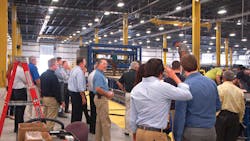Vanguard National seeks geographic leverage with new dry van plant
Vanguard just underlined the “National” in Vanguard National.
Now in its second decade of building van trailers in Monon, Indiana, the company decided a few years back that the trailer market in the United States is far too big to be served from one trailer manufacturing plant.
Even though Vanguard is headquartered in the heart of the national trailer market, the company concluded that there are plenty of customers in this nation who can be better served if the trailers they buy are built a little closer to home.
Management realized that an entire quadrant of the United States—the Southeast—had a grand total of zero manufacturing plants for producing dry-freight vans. That, Vanguard believes, is a window of opportunity big enough for a special permit heavy hauler trailer to pass through, let alone a standard 53-foot van trailer.
“With no dry van manufacturing plant in the Southeast United States, we felt that this part of the country was underserved,” says Charlie Mudd, president.
Vanguard began looking into several possible locations for a plant in the Southeast approximately three years ago. In addition to wanting the best location, the company also was concerned about building one with the right size—a plant capable of meeting current demand, the ability to be scaled to meet future demand, all with overall trailer industry manufacturing capacity in mind.
With trailer manufacturers setting a production record in 2015, industry analysts have given thought to the overall capacity of the trailer manufacturing industry—including Vanguard. The last time the trailer manufacturing industry built more than 300,000 trailers in one year was in 1999. That landmark year was followed by an industry downturn severe enough to force trailer manufacturers to close plants. Mudd did not want to contribute to history repeating itself.
“We didn’t want to build a plant so big that we would dilute the industry,” he says. “This plant is relatively small. It’s capable of producing 10,000 trailers per year. Given overall industry capacity, that is not a massive expansion of industry capacity. We have designed it, though, to efficiently build dry freight vans. It’s the right size for us to enable us to improve our ability to serve our customers in the Southeast.”
The plant has only been in operation since August and has a considerable way to go before reaching full capacity. Yet it also has the potential of being significantly more efficient than the main plant in Monon. That’s because it had the advantage of being designed and built exclusively to build dry freight vans. Vanguard did not have to make its manufacturing plant fit inside an existing building—or set of buildings.
Vanguard initially got its in 2003 by acquiring assets of HPA Monon, manufacturers of Monon Trailers. Among those assets were Monon’s multiple buildings—some of which were 50 years old when the van manufacturer closed its doors.
“The beauty of this plant is that it allows us to put everything under one roof,” says Mark Roush, Vanguard’s vice-president of engineering. “We have invested significantly in the Monon plant, but we still have operations in multiple buildings. There’s nothing like getting everything under one roof for improving efficiency.”
Bring it with you
The new plant may have a completely different footprint from the Vanguard campus in Monon, but basic material flow is similar to that of the Indiana plant—essentially U-shaped, with special carts carrying the trailers through much of the assembly process.
One big difference is an array of new automated equipment to improve efficiency. Another difference is the 70 feet between support columns. This enables the building to produce 60-ft trailers with five feet of work room on both ends of the trailer.
“We don’t know at this point if 60-ft trailers will be authorized,” Roush says. “But if they are, we will be ready.”
Looking around
The plant is the result of a three-year project. Vanguard started by searching several states for a location before choosing an industrial park site in Trenton, Georgia, just off Interstate 59 20 miles southwest of Chattanooga, Tennessee.
“We had very strong support from the state of Georgia, Dade County and the city of Trenton,” Mudd says. “When we reach capacity, this plant will contribute 400 jobs to the area.”
Vanguard is planning a gradual ramp-up to full production. In early November, human resources was one of the most active areas of the plant. Employment was at 90 people.
“We need about 90 more,” says Kevin Black, plant manager.
The plan is for the plant to be at full capacity in three years. The project is off to a good start. After selecting the Trenton site, the company broke ground September 3, 2015. Less than a year later, the 356,000-sq-ft plant was manufacturing trailers.
The project came in on time and under the $36 million budget, Mudd says.
The plant has an estimated production capacity of 10,000 trailers—something that Vanguard needed to shrink backlogs that stretch out as much as a year during the recent boom in trailer demand.
Mudd said the entire project was designed and planned by the Vanguard team.
To celebrate the plant’s opening, Vanguard held an open house for its dealers and suppliers November 3.
About the Author
Bruce Sauer
Editor
Bruce Sauer has been writing about the truck trailer, truck body and truck equipment industries since joining Trailer/Body Builders as an associate editor in 1974. During his career at Trailer/Body Builders, he has served as the magazine's managing editor and executive editor before being named editor of the magazine in 1999. He holds a Bachelor of Journalism degree from the University of Texas at Austin.
